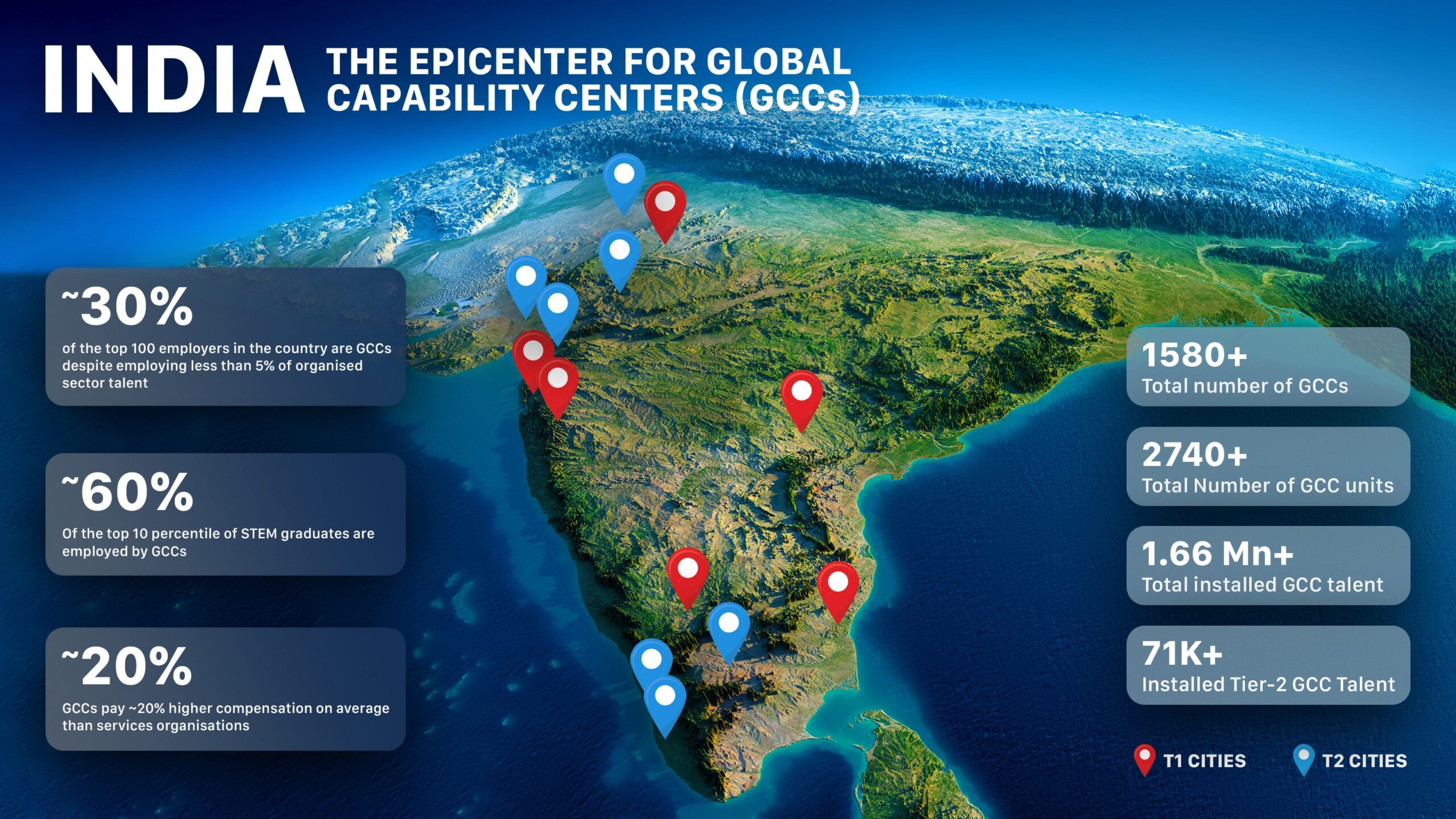
India, with its vast and diverse landscape, burgeoning population, and rapidly growing economy, is at a pivotal point in its development journey. One of the key drivers propelling this growth is the establishment of Global Capacity Centers (GCCs).
GCCs, also known as Global In-house Centers (GICs) or Captive Centers, are strategic business units set up by multinational corporations in India to leverage the country's talent pool, cost advantages, and technological prowess. The impact of GCCs on India's infrastructure development is profound and multifaceted.

Enhancing Technological Infrastructure
GCCs are instrumental in advancing India's technological infrastructure. By setting up operations in India, global companies bring cutting-edge technologies, best practices, and innovative solutions. This influx of technology not only benefits the companies themselves but also fosters a culture of innovation and technological advancement within the country.
Boosting Employment and Skill Development
One of the most significant contributions of GCCs to India's infrastructure development is the creation of employment opportunities. GCCs employ a large number of skilled professionals, including engineers, data scientists, IT specialists, and business analysts. This not only helps in reducing unemployment but also promotes skill development.
Strengthening Urban Infrastructure
The establishment of GCCs often leads to the development of urban infrastructure in the regions where they are located. Cities like Bengaluru, Hyderabad, Pune, and Gurugram have witnessed significant infrastructural development due to the presence of GCCs. This includes the construction of modern office spaces, improved transportation networks, better housing facilities, and enhanced public amenities.
Encouraging Foreign Direct Investment (FDI)
GCCs play a crucial role in attracting Foreign Direct Investment (FDI) to India. The presence of a robust GCC ecosystem makes India an attractive destination for global companies looking to expand their operations. This influx of FDI not only boosts the country's economy but also leads to the development of critical infrastructure projects.
Promoting Sustainable Development
Many GCCs are committed to sustainable development practices and corporate social responsibility (CSR) initiatives. They invest in green buildings, energy-efficient technologies, and sustainable waste management practices. Additionally, GCCs often engage in community development projects, such as building schools, healthcare facilities, and clean water initiatives.
The role of state governments
Several Indian states are proactively designing GCC-specific policies to attract investments. For instance:
Karnataka: The state became the first to launch a dedicated GCC policy, rolling out a draft in September 2024 before the final version was released in November. The Karnataka GCC Policy: 2024-2029 aims to attract 500 new GCCs in the next five years, creating 350,000 jobs and generating an economic output of US$50 billion. Incentives include rental reimbursements, funding for innovation labs, and skilling expense reimbursements.
Uttar Pradesh: The state’s GCC Policy 2024 is targeting over 1,000 GCCs and 500,000 jobs, offering fiscal incentives such as 100 percent stamp duty exemptions and payroll subsidies.
Maharashtra: Known for its robust data connectivity and reliable infrastructure, Maharashtra is actively engaging with stakeholders to develop its own GCC policy, focusing on investments in technology parks and Special Economic Zones.
These state-specific policies, combined with the central government’s umbrella framework, aim to position India as a top choice for global corporations looking to establish GCCs.
Here are some stock stories highlighting Indian companies that have benefited from the trend of Global Capacity Centers (GCCs):
Tata Consultancy Services (TCS)
Benefiting from Global Capacity Centers: TCS has leveraged its extensive GCC network to provide cutting-edge IT services and solutions to global clients, driving significant revenue growth and technological advancements.
Infosys
Benefiting from Global Capacity Centers: Infosys has capitalized on the GCC trend by offering innovative digital transformation services, which have attracted numerous multinational clients and boosted its market presence.
Wipro
Benefiting from Global Capacity Centers: Wipro's strategic investments in GCCs have enabled it to deliver high-quality IT and business process services, enhancing its competitiveness and expanding its global footprint.
HCL Technologies
Benefiting from Global Capacity Centers: HCL Technologies has utilized its GCCs to develop advanced software solutions and IT infrastructure services, resulting in increased client acquisition and market share.
Tech Mahindra
Benefiting from Global Capacity Centers: Tech Mahindra's focus on establishing GCCs has allowed it to offer specialized IT and telecom services, driving growth in its client base and revenue streams.
Cognizant
Benefiting from Global Capacity Centers: Cognizant has benefited from its GCCs by providing comprehensive IT and consulting services to global clients, leading to enhanced operational efficiency and business growth.
Larsen & Toubro Infotech (LTI)
Benefiting from Global Capacity Centers: LTI has leveraged its GCCs to deliver innovative IT solutions and digital services, contributing to its strong performance and expansion in international markets.
Mindtree
Benefiting from Global Capacity Centers: Mindtree's investment in GCCs has enabled it to offer cutting-edge technology solutions and digital transformation services, resulting in increased client engagements and revenue growth.
Mphasis
Benefiting from Global Capacity Centers: Mphasis has capitalized on the GCC trend by providing specialized IT services and solutions, which have attracted global clients and driven its business growth.
Persistent Systems
Benefiting from Global Capacity Centers: Persistent Systems has utilized its GCCs to develop innovative software products and IT services, enhancing its market position and client base.
Conclusion
Global Capacity Centers are indeed a boon for India's infrastructure development. They bring technological advancements, create employment opportunities, strengthen urban infrastructure, attract foreign investment, and promote sustainable development. As India continues on its path of economic growth and development, the role of GCCs will become increasingly significant.